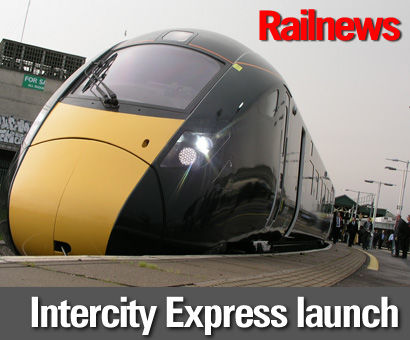THE first Intercity Expresses have gone into service with Great Western Railway, and two Class 800 bi mode trains ran between London, Bristol and Swansea during 16 October.
However, problems on the first scheduled train carrying passengers, the 06.00 from Bristol Temple Meads to London Paddington, have been followed by an apology from the train’s builders Hitachi, who said last night that they ‘must do better’ and that an investigation of the causes is underway.
The inaugural service was carrying transport secretary Chris Grayling, but departure was delayed until 06.25 because of a minor technical fault. Worse was to come when a problem with air conditioning later in the journey caused water to drip on some passengers, and arrival in London was 41 minutes later than booked.
The units were withdrawn from service for attention at Old Oak Common after they had arrived at Paddington, which meant they could not be used on the 08.15 to Cardiff Central as planned.
A second pair of Class 800s worked the 07.00 from London to Bristol without any problems on board.
Chris Grayling shrugged off the faults after his journey from Bristol, telling The Independent: “I think the train’s fantastic. A few teething problems but the reality is that this is going to transform Intercity rail travel in the UK – not just here on the Great Western line, but on the East Coast main line and the Transpennine route.
“What passengers really care about is having a smart, new train, high-quality wi-fi, lots of seats. This is the future of intercity railways.”
The managing director of Hitachi Rail in Europe, Karen Boswell, said: “Today marked an important milestone for Hitachi and the partners in the Intercity Express programme. Nine years of hard work has gone into making this vital fleet upgrade happen, including creating a brand new factory and establishing modern maintenance facilities.
“I am, however, very sorry and disappointed that today’s first train from Bristol encountered technical issues, causing a delay to the service and an air conditioning issue which resulted in water entering the carriage rather than being discharged externally. This was not to a standard that Hitachi expects and is known for. We can and will do better. Our depot teams are as a matter of priority investigating the root causes.”
The first trains were able to run under electric power between London and Maidenhead, but the line as far as Didcot Parkway will be energised at the start of January, and electrification should reach Cardiff by the end of next year. Some key sections on the route beyond Didcot, such as the Severn Tunnel, have already been equipped with OHLE.


